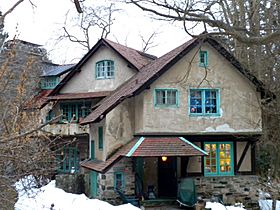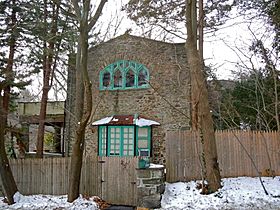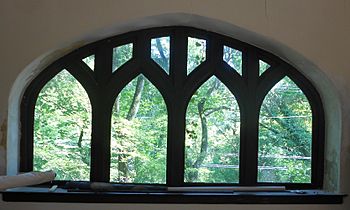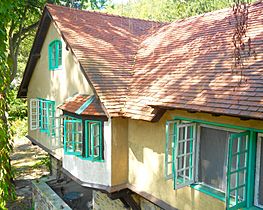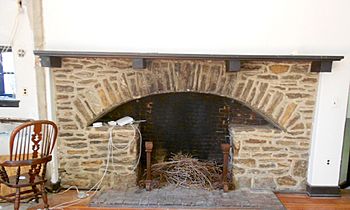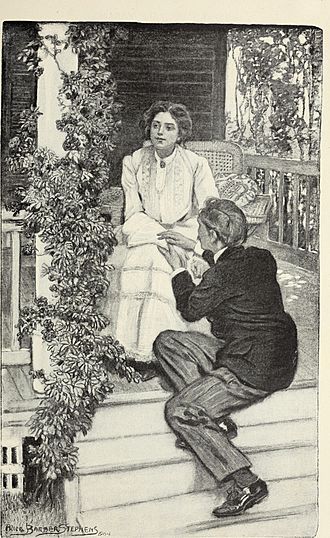Thunderbird Lodge (Rose Valley, Pennsylvania) facts for kids
Quick facts for kids |
|
|
Thunderbird Lodge
|
|
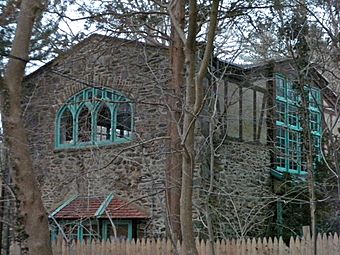
The circa-1790 barn was converted into artist studios.
|
|
| Location | 41 Rose Valley Road Rose Valley, Pennsylvania |
|---|---|
| Area | 1.6 acres (0.65 ha) |
| Built | 1790; 1904 |
| Architect | William Lightfoot Price |
| Architectural style | Arts and Crafts Movement |
| NRHP reference No. | 89001053 |
| Added to NRHP | August 18, 1989 |
Thunderbird Lodge is a special building in Rose Valley, Pennsylvania, a community known for its history and unique style. It was once an old barn built around 1790. Later, in 1904, it was transformed into a beautiful home and art studios. This lodge is important because of its design and the famous people who lived there.
Contents
Meet the Architect: Will Price
In 1904, a talented architect named Will Price turned the old barn into bright studios for artists. He added a new house section made of stone and stucco. This new part included a cool, eight-sided tower that connected everything. It even had five different levels!
Will Price was one of the people who started Rose Valley. He wanted to create a place where artists and craftspeople could work together. They followed ideas from the Arts and Crafts movement. This movement believed in using natural materials honestly. It also valued traditional skills and simple, beautiful designs. Price made sure the new parts of the house blended perfectly with the old barn. He used similar stones, so it's hard to tell where the old building ends and the new one begins.
Artists and Activists Who Lived Here
The Stephens Family: Artists at Work
The first artists to live and work at Thunderbird Lodge were Charles H. Stephens and Alice Barber Stephens. Charles (1864–1940) was a teacher at a famous art school in Philadelphia. He was known for painting pictures of Native American people. He had even lived with the Blackfeet Nation and collected many interesting items.
Inside his studio, the fireplace has a special design. It looks like a Thunderbird, which is a powerful bird in some Native American stories. You can also see Thunderbird symbols on the outside of the building. These were made from special tiles. Alice Barber Stephens (1858–1932) was also a very successful artist. She drew pictures for magazines and children's books. They raised their son, D. Owen Stephens, at Thunderbird Lodge and continued their art there.
The Olmsted Family: Working for Change
After the Stephens family, Thunderbird Lodge became home to another important couple: Allen Seymour Olmsted and Mildred Scott Olmsted. They were both very active in working for social change. Allen was a lawyer who helped start the American Civil Liberties Union. This group works to protect people's rights. He also supported women's right to vote.
Mildred was a leader of the U.S. section of the Women's International League for Peace and Freedom. This group works for peace around the world. Together, the Olmsteds worked with many groups that helped people. They supported civil rights and peace. Their home was a safe place for other important activists to meet. These included famous people like Jane Addams, James Farmer, George Washington Carver, and Martin Luther King, Jr..
In 2015, a special marker was placed near the house to honor Mildred Scott Olmsted. The Olmsted family later gave Thunderbird Lodge to the Rose Valley Centennial Foundation.
The Great Minquas Path
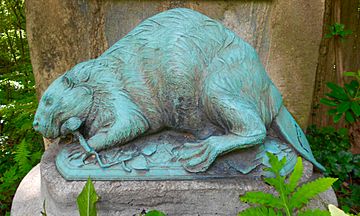
Near Thunderbird Lodge, along Rose Valley Road, there's a historic marker. It was put there in 1926. This marker remembers the Great Minquas Path. This was an important trading route used by Native American people way back in the 1600s. Charles Stephens, one of the artists who lived at the lodge, designed the picture on the marker. A sculptor named Albert Laessle created the beaver sculpture below it.
Thunderbird Lodge was added to the National Register of Historic Places in 1989. This means it's recognized as a very important historical site. It's also part of the larger Rose Valley Historic District, which was listed in 2010.
 | John T. Biggers |
 | Thomas Blackshear |
 | Mark Bradford |
 | Beverly Buchanan |




